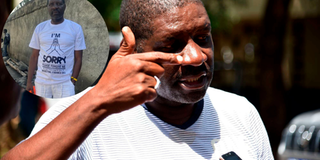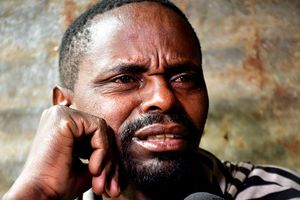
Members of the public and church leaders during a ‘cleansing ceremony’ at MP Kuria Kimani’s home on Friday. Anti-tax protesters looted property and burnt the MP’s cars.
Hardly anyone predicted that 2024 would be the year of accountability in Kenya’s political space, sometimes using methods that could be considered unusual, but that is what it is shaping up to be.
Events in the last few days have put institutions, political leaders and other influential individuals under the sort of intense pressure they have probably never experienced before as the electorate — led by young Kenyans — has taken to questioning their decisions and putting their property and conduct under a microscope.
Through means that are legal and others that the authorities say border on harassment: mobile phone numbers are being shared publicly, leaders are being booed or walked out on, online accountability tools are being created, recall processes are being considered and the “Occupy” movement is targeting institutions like State House, Parliament and churches, among other actions.
This has led to the cancellation of at least two high-profile fundraisers this weekend; one was to involve First Lady Rachel Ruto in Lavington on Sunday, June 30, and the other was Deputy President Rigathi Gachagua’s event in Murang’a, which was called off on Saturday at the last minute.
At least 10 MPs’ homes, businesses or offices have been targeted.
It has also led to a growing list of public apologies from lawmakers, embattled for voting in favour of the now-shelved Finance Bill, 2024 — apologies that have been characterised by different stylistics.
But it is not just the legislators. State House advisers, the Interior ministry and the police for their violent handling of protesters, which left 23 dead and nearly 300 injured, have this week become the targets of a monumental accountability drive planned almost entirely on social media.
The church is also being targeted for allowing politicians and other influential individuals to preach their policies from the pulpit, or donate huge amounts of money in fundraisers, against the wishes of the youth.
The sixth theory in the famous The 48 Laws of Power speaks about courting attention at all costs. “Everything is judged by its appearance. What is unseen counts for nothing. Never let yourself get lost in the crowd or buried in oblivion. Stand out. Be conspicuous at all costs. Make yourself a magnet of attention by appearing larger, more colourful, more mysterious than the bland and timid masses,” it says.
That used to do the trick before the political consciousness of Kenya’s youth was stirred by the now-shelved Finance Bill, 2024.
Politicians have been known to be flashy as a way of showing their electorate that they are playing in a different league. They will typically want to be the ones donating the highest amount in any fundraiser, donning the costliest watch around, wearing the rarest of bespoke suits, fitting the most expensive belts, sporting the most advanced hairstyles, driving the latest fuel guzzlers and making grand entrances in choppers wherever they are heading.
However, with the recent wave of consciousness, such opulence is an Achilles’ heel. Speakers in X Spaces, formerly Twitter, held to discuss the reason for the anger among Kenya’s youth have repeatedly mentioned the largesse and opulence of the political class as one of their reasons for demanding a leaner budget. With a call not to allow politicians to speak in church gaining momentum, some worship centres have had to readjust their programmes.
Lavington United Church was to host Mrs Ruto today but it cancelled its fundraiser after its invitation circulated online.
As it has been happening in the wave of consciousness, it didn’t take long before a contact of an official at the church was shared. The contact received communication from some people who reminded the church that the masses did not want to entertain people allied to the government.
In Murang’a, the Catholic Church withdrew from hosting Deputy President Rigathi Gachagua for a fundraiser at the 11th hour yesterday. Mr Gachagua was to lead a fundraiser to buy the Maragua Catholic bishop an official car.
However, as it happened with the Lavington case, church officials got contacted about hosting the DP. The church leader, Fr Maria Wainaina, said in a statement that they had withdrawn having the DP as the chief guest.
However, a fundraiser happened at Kaharati Primary School that was dubbed an education endowment fundraiser. Mr Gachagua attended this one.
Besides the cancelled fundraisers, apologies from lawmakers keep flowing, with Tetu’s Geoffrey Wandeto and Nakuru East’s David Gikaria being the latest in the list.
Mr Gikaria issued a rare apology on Friday, which saw the MP and his wife wear a white designer T-shirt emblazoned with the words; “I am sorry. Please forgive me for not listening to you and rejecting the Finance Bill”. The T-shirt, he told the Sunday Nation, was printed by someone in the Gen-Z age group.
The lawmaker, who involved his wife in making this apology, said: “We decided as a family to apologise because when I’m being blamed, my family is also blamed — including my children. They carry that burden. I wanted to involve my daughter but she was not around.” Mr Wandeto issued a statement stating that he was sorry for falling short of his electorate’s expectations.
Other MPs who have apologised include John Kiarie (Dagoretti South) and Joseph Namuar (Turkana Central). Mr Kiarie made his apology through a handwritten letter.

Dagoretti South MP John Kiarie's handwritten apology.)
Elsewhere, Machakos Town MP Caleb Mule is facing recall for supporting the Finance Bill after two residents, Joseph Mutinda Thomas and Thomas Mutuku Wambua, set off the long process by notifying the lawmaker of their intention.
At the same time, security agencies were on high alert amid widespread rumours that anti-tax protesters targeted rural homes and businesses operated by MPs Nimrod Mbai (Kitui East), Rachael Kaki (Kitui South), Vincent Musyoka (Mwala), Fabian Kyule (Kangundo), and Mwengi Mutuse (Kibwezi West).
Masinga MP Joshua Mwalyo, who was absent when MPs voted for the controversial Bill, revealed that protesters had threatened to set his house on fire. Others who have had their offices or homes attacked or targeted are National Assembly Leader of Majority Kimani Ichung’wah, Majority Whip Sylvanus Osoro, National Assembly Finance and Planning Committee chairperson Kimani Kuria, Kuria East MP Marwa Kitayama, Kieni’s Njoroge Wainaina, and Imenti North’s Rahim Dawood.
“The Bill has made our lives difficult. I am among the MPs who faced direct threats of arson,” Mr Mwalyo told reporters. As if to add to MPs’ worries, a website dubbed “Wall of Shame” has been started. It lists every MP who voted in favour of the Bill. The people behind the website are populating the lawmakers’ X handles, their phone numbers, and the businesses they are involved in.
Another platform allows Kenyans to activate the initial stages to recall their MPs and allows them to collect signatures electronically while giving details of the relevant process and law.
Yet another young expert has come up with a forum aided by Artificial Intelligence that lists corruption allegations linked to various politicians.

The website is part of the technology-aided interventions towards putting leaders to account. Another aspect involves the use of phones. Besides spamming leaders with messages, the phones are being used to check on policing during protests. By capturing photos and videos, they have created a crowdsourced CCTV camera that tracks the actions of the police.
The Sunday Nation contacted three lawyers, two of whom have been lawmakers, for their comments on the new trend of pushing for accountability. Mr Kenneth Marende, a former Speaker of the National Assembly, said it is a healthy development. “The youth were very particular that various institutions, including Parliament, are exercising delegated powers which can be taken away should they feel that the MPs have failed to consider their views,” said Mr Marende.
“If the public offices were functioning well as envisioned, then what happened of phone numbers of MPs being shared, their properties being attacked and Parliament being invaded would not have happened,” he added, noting that the actions point to a lack of trust in institutions.
Former Borabu MP Ben Momanyi also said the youth are justified in sharing the contacts of leaders. “Even when we are looking for votes, we send them messages asking for their support. Our MPs seem to have become rogue. They have become voiceless. They take instructions from the State House and ignore what the electorate is asking for,” said Mr Momanyi. “I saw them bulldoze through the Finance Bill when people were protesting right outside Parliament, and they were really excited after voting ‘yes’. The same people were happily clapping for the President the following day when he rejected the Bill in response to the protests. Have they lost their brains or are they votes for hire?” He asked.
Lawyer Bobby Mkangi said it is all fair game with the sharing of leaders’ contacts, though he disagreed with those who reveal contacts of spouses and other family members. “Going for the numbers of their spouse and children is what I would say is an invasion of privacy. When you are a State officer, I would imagine there is a number that is known to the public,” he said.
The Office of the Data Protection Commissioner warned earlier in June against sharing a person’s contacts as it is against the law.
On Saturday, the DP asked the youth to allow their legislators to do their job until the next election.













